
THE LADY AND THE DUKE: The stakes in this talkfest are not a spoiled vacation but the death of thousands and the course of history. |
| “The Human Comedies of Eric Rohmer” | Harvard Film Archive: August 20-30 |
For Jean-Louis, the dour engineer played by Jean-Louis Trintignant in
MY NIGHT AT MAUD'S (1969; August 20 at 7 pm), one of 10 superb miniatures screening in the Harvard Film Archive's series "The Human Comedies of Eric Rohmer," every woman with whom he has an affair poses a moral challenge.
That's also true of every film by Eric Rohmer. Like Robert Bresson, he aspires to the spiritual in cinema. But like Trintignant's engineer, he's not averse to a little hootchie-kootchie along the way. It's kind of like the objection Jean-Louis has to Pascal's austere, fatalistic Jansenism: what's the point if you can't also enjoy a nice glass of wine?
Or some good conversation. There's lots of it in Rohmer's films, smart, fascinating talk from attractive, interesting people, most of it taking place in beautiful locations photographed by legends like Néstor Almendros. Such loveliness, and yet the people still feel miserable — their wordy confusions contrast with the limpid clarity of their surroundings.
The subject of their talk, no surprise, is what they should be doing to make themselves happy, or their lives meaningful, or both. How can the engineer in My Night at Maud's, a Catholic with a libertine past, amend his life and make the leap to wed the stranger he's fallen in love with at first sight? Or should he? Nothing is resolved until he's snowed in with his all-too-accommodating hostess Maud and the abstract conversation grows fraught with carnal possibilities.
Weather is also a factor in CLAIRE'S KNEE (1970; August 21 at 7 pm), a kind of updating of Choderlos de Laclos's Dangerous Liaisons. Jerome, a genial 30ish hedonist, allows himself to serve as a guinea pig in an "experiment" orchestrated by a novelist friend. What would happen if they manipulated the crush that coltish, 15-year-old Laura so clearly has on him? They don't figure on such unknown factors as the comely knee of the title, or the sudden downpour that leaves Jerome stranded with its owner, Laura's alluring friend Claire.
As intelligent as Rohmer's people are, they can be opaque when synchronicity comes knocking. Signs and portents are sought but not always recognized. In SUMMER (1986; August 22 at 7 pm), perhaps my favorite of all Rohmer's films, a young woman goes on vacation in the hope that something might happen that will shake her out of her loneliness. She plays cards, reads her horoscope, tries to meet new people. Only a miracle can save her, and Rohmer slyly conjures one, ending with an image that could illustrate what James Agee termed "the incontrovertible perception of the incredible."
Sometimes the incredible involves a little human nurturing, like the wine that sets up the moment of truth in the exquisite AUTUMN TALE (1998; August 28 at 7 pm). And sometimes Rohmer himself imposes artifice on his usual naturalism, even using special effects in his late film THE LADY AND THE DUKE (2001; August 21 at 9 pm). Its Revolutionary Paris setting is brought to life by the CGI animation of detailed drawings derived from period engravings. The result is a ghostly realism like a dream of the past.